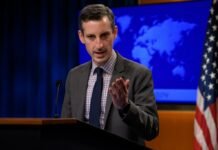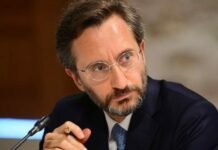Joy Anna Crow Subaşıgüller, a US citizen married to a Turkish Protestant pastor, has been told to leave Turkey in 10 days, according to a report by Deutsche Welle’s (DW) Turkish service.
The decision came after the application to renew her residence permit was denied by the Ministry of Interior’s immigration office without the provision of any justification.
Subaşıgüller has been living in Turkey with her husband and children for the last 10 years. They haveappealed the decision to a Turkish court.
Joy Anna Crow Subaşıgüller is the spouse of Lütfü Subaşıgüller, pastor of the Başkent Church in Ankara. The couple have three children: a 4-month-old baby girl, a 2-year-old boy and a 4-year-old girl. Lütfü Subaşıgüller said the decision was a threat to the unity of his family. “My children can’t live without their father or mother. … Do they want us to leave our home, extended family and country? Me and my three children are Turkish citizens. How am I supposed to explain this to them in the future?”
He also complained about the secrecy that surrounds such cases, “If there is anything suspicious, then take us to court, tell us what we are accused of and present the evidence. If there is any wrongdoing, put us in prison.”
His wife said she was shocked by the decision. “I love Turkey and Turkish people. I have been living in this country for 10 years, and they have been the best years of my life. I am thankful for that. … I am not a dangerous person. I am just taking care of my kids at home,” she said.
Speaking to DW Turkish, head of the Istanbul Protestant Church Foundation Timur Topuz said it was as if all Protestants in Turkey were declared enemies after the “pastor Brunson incident” and became the targets of intimidation policies. He said Protestant clerics and their families were systematically denied residence permits and the existing permits were revoked. According to Topuz more than 100 Protestants, including their families, have experienced such problems.
American pastor Andrew Brunson was arrested in the aftermath of a July 15, 2016 coup attempt due to alleged ties to the “Fethullahist Terrorist Organization” (a derogatory term used by the Turkish government for the faith-based Gülen movement) and the outlawed Kurdistan Workers’ Party (PKK), a terrorist organization recognized as such by Turkey, the US and the European Union. His lengthy pre-trial detention of almost two years had caused friction between Washington and Ankara. Shortly after the US government started taking measures to hurt the Turkish economy and threatened further sanctions unless Brunson was released, a Turkish court convicted Brunson of aiding several terrorist organizations and sentenced him to time served. Brunson returned to the US immediately after his release.
Lütfü Subaşıgüller said he was very sad about what they have been going through. “It seems they want to deport my wife, just like other Protestant clerics from foreign countries and their families, because they are considered a threat to national security and public order, and that really hurts us. …We pray for and protect the interests of our country,” he said.
Pro-Kurdish Peoples’ Democratic Party deputy from Mardin Tuma Çelik took the issue to the Turkish Parliament. In a parliamentary question to Interior Minister Süleyman Soylu, Çelik said the rise in the number of deportation cases was endangering religious liberties.
Çelik asked Soylu the definition of the “N82” and “G82” codes used in residence permit cancellation cases and the number of clerics and other people who were deported in such cases. He claimed the said codes were used in denial and cancellations where there was a “threat to national security.” Çelik also asked Soylu about the rumors of a National Intelligence Organization (MİT) report whichincluded a list that is being used as the basis of deportations.
Entry bans, denial of residence permit renewals and deportations for long-time residents affiliated with Protestant churches in Turkey were also highlighted in the US State Department’s 2019 International Religious Freedom Report. The report also mentioned that the Protestant communities could not train clergy in the country and relied on foreign volunteers to serve them. According to the report although the local communities stated their aim to develop in indigenous Turkish leaders in their congregations, they faced difficulties because they could not operate training facilities in-country.
















